| Part #: | |
|---|---|
| Model: | KR-87 |
| Desc: | ADF Receiver |
| OEM: | BendixKing |
| NSN: | |
|---|---|
| Sched-B: | 8526910070 |
| ECCN: | |
| Cage Code: | 22373 |
 Select part number above to view pricing and availability.
Select part number above to view pricing and availability.
| Price | Condition | Availability | Stock Info | |
|---|---|---|---|---|
| Price | Cond. | Avail. | Stock Info | |
| $2,150.00 | SV OUTRIGHT | 3 IN STOCK |
Serial #: 48642 [Details]
Serial #: 9194 [Details]
See More Stock
|
|
| $1,350.00 | SV EXCHANGE | 3 IN STOCK |
Serial #: 48642 [Details]
Serial #: 9194 [Details]
See More Stock
|
| Price | Condition | Availability | Stock Info | |
|---|---|---|---|---|
| Price | Cond. | Avail. | Stock Info | |
| $2,150.00 | SV OUTRIGHT | 1 IN STOCK |
Serial #: 61429 [Details]
|
|
| $1,550.00 | SV EXCHANGE | 1 IN STOCK |
Serial #: 61429 [Details]
|
| Price | Condition | Availability | Stock Info | |
|---|---|---|---|---|
| Price | Cond. | Avail. | Stock Info | |
| REQUEST | OH OUTRIGHT | REQUEST LEAD TIME |
|
| Price | Condition | Availability | Stock Info | |
|---|---|---|---|---|
| Price | Cond. | Avail. | Stock Info | |
| $2,150.00 | SV OUTRIGHT | 2 IN STOCK |
Serial #: 79208 [Details]
Serial #: 81921 [Details]
|
|
| $1,550.00 | SV EXCHANGE | 2 IN STOCK |
Serial #: 79208 [Details]
Serial #: 81921 [Details]
|
|
| REQUEST | NEW OUTRIGHT | REQUEST LEAD TIME |
|

KR-87
- Digitally tuned solid state automatic direction finder which provides bearing information to stations in the frequency range of 200 KHz to 1799 KHz and which also provides audio reception to enable pilot to identify stations
- Used with KA-44B combined loop/sense low profile ADF antenna OR KA-44 blade antenna
- Can be used with single needle KI-227 ADF indicator or dual needle KI-228 indicator (both indiactors available with manual or slaved compass cards)
- May be interfaced to King KI-229 or KNI-582 RMIs
- Can be interfaced with other 3-wire RMI indicators by way of KDA-692 RMI adapter
- Models available with single or dual indicator driving capability (see table below)
- Models available with ADF Superflag output for use with EFIS systems (see table below)
- Internal timer for flight time and elapsed time which proves valuable for non-precision timed approaches, fuel management, dead reckoning navigation
- Automatic dimming circuit adjusts the brightness of the display to compensate for changes in the ambient light level
- Coherent detection design rejects unwanted frequency interference, achieves significantly greater range and has less suspectiblility to engine noise, static and atmospheric interference
- Flip-flop frequency display allows to switch between pre-selected "standby" and "active" frequencies
- Operates on any voltage from 11-33 VDC with 12 watts power consumption
- Models available for 28 volt use only (see table below)
- Models available with 5 volt display lamps (see table below)
- Models available with standard or shiny display lens (see table below)
- Models available with clear or blue display light (see table below)
- Models available with backlit nomenclature (see table below)
- Forced air cooling not required
- TSO'd
Additional Information: Click Here for Pilot's Guide
| Size: | 6.32"W x 1.35"H x 10.73"L | Weight: | 2.9 lbs. |
| TSO Compliance: | TSO C41c Class A, DO-160 Env. Cat A1D1/A/SKP/XXXXXX/ZBABA | Applicable Documents: | RTCA DO-142 |
| Frequency Range: | 200KHz to 1799KHz in 1 KHz increments | Receiver Selectivity: | 6dB bandwidth: +-2 KHz max off center frequency; 80dB bandwidth: +-7 KHz max off center frequency |
| Bearing Accuracy: | +- 3 degrees from 70 uV/m to 0.5 V/m RF input signal level | Power Requirements: | 11 to 33 VDC, 12W typical |
| Temperature Range: | -20 to +55C | Altitude Range: | Up to 50,000 feet |
| Receiver Senstivity: | 150uV/m max for s+n/n = 6dB | Spurious Response | 80dB down +-12KHz from center frequency |
| Indicator Drive: | DC sine and cosine voltages 4.5 +- 3.0VDC at 150mA max | Audio Output: | 50mW across 500ohm |
| Part Number | ADF Receiver Description |
|---|---|
| 066-1072-00 | Standard lens, Single Indicator Use, 14/28V lamps, clear lighting |
| 066-1072-01 | Shiny lens, Single Indicator Use, 14/28V lamps, clear lighting |
| 066-1072-02 | Standard lens, Dual Indicator Use, 14/28V lamps, clear lighting |
| 066-1072-03 | Shiny lens, Single Indicator Use, 14/28V lamps, clear lighting |
| 066-1072-04 | Standard lens, Single Ind Use, Superflag output, 14/28V lamps, clear lighting |
| 066-1072-05 | 28V only, Std lens, Dual Ind Use, Superflag output, 14/28V lamps, clear lite |
| 066-1072-06 | Exclusively for the CNI-5000 radio package, Standard lens, Single Indicator Use, Superflag output, 5V lamps, blue lighting, No Faceplate |
| 066-1072-07 | Standard lens, Single Indicator Use, Superflag output, 5V lamps, blue lighting |
| 066-1072-14 | Std lens, Single Ind Use, Superflag, 14/28V lamps, clear lite, backlit nomen - this P/N also used for Silver Crown Plus version |
| 066-1072-15 | 28V, Std lens, Dual Ind, Superflag, 14/28V lamps, clear lite, backlit nomen |
| 066-1072-17 | Std lens, Single Ind Use, Superflag, 5V lamps, blue lite, backlit nomenclature |
PLEASE NOTE:
THE ABOVE LISTED PART NUMBERS REFLECT THE DIFFERENT UNITS ORIGINALLY AVAILABLE BY THE MANUFACTURER AND DO NOT NECESSARILY INDICATE OR REFLECT THE CURRENT AVAILBILITY OF THESE DIFFERENT UNITS BY SOUTHEAST AEROSPACE OR THE AFTERMARKET
NSN: 1680-01-597-7850
| Price | Condition | Status |
|---|---|---|
| $2,150.00 | SV OUTRIGHT | 2 IN STOCK |
| $1,550.00 | SV EXCHANGE | 2 IN STOCK |
| REQUEST | NEW OUTRIGHT | REQUEST LEAD TIME |
NSN: 5895-01-287-3705
| Price | Condition | Status |
|---|---|---|
| $2,150.00 | SV OUTRIGHT | 3 IN STOCK |
| $1,350.00 | SV EXCHANGE | 3 IN STOCK |
NSN: 5826-01-421-1135
| Price | Condition | Status |
|---|---|---|
| $2,150.00 | SV OUTRIGHT | 1 IN STOCK |
| $1,550.00 | SV EXCHANGE | 1 IN STOCK |
| Price | Condition | Status |
|---|---|---|
| REQUEST | OH OUTRIGHT | REQUEST LEAD TIME |
Click on a question below to see the answer. If you have a question about this model that is not answered below, please contact questions@seaerospace.com
Why do some parts indicate "REQUEST" or “RFQ” on the Southeast Aerospace website?
In relation to NE (New) parts, many OEMs change their prices and availability without any notice to dealers or the industry. Therefore, through the REQUEST or RFQ indication, we ask that customers contact us for the most accurate price and availability.
In relation to SV & OH parts, the used parts aftermarket in the aviation industry is not an infinite supply. It is a dynamic, constantly changing market that is significantly affected by and susceptible to highs and lows in supply and demand. Therefore, although we attempt to, at times, we are unable to predict the exact moment when an item may be available. Once again, through the REQUEST or RFQ indication on our website, we ask that customers contact us for the most current and accurate price and availability.
Can antennas from different ADF systems be interchanged?
What is the difference between Honeywell (Bendix/King) part numbers with 9 digits vs. 12 digits?
Why did Bendix/King change their part numbers from a 9 digit to a 12 digit format?
Different software versions imply different operational features and/or interface capabilities and software modifications imply software repairs (bug fixes) to insure proper operation of these features and interfaces. Software version upgrades frequently require hardware modifications to the unit. Such hardware modifications accompanying software version upgrades do not necessarily change the hardware version of the unit.
What is the difference between the Silver Crown and Silver Crown Plus (+) version of the KR-87?
Please see example below of the different versions:
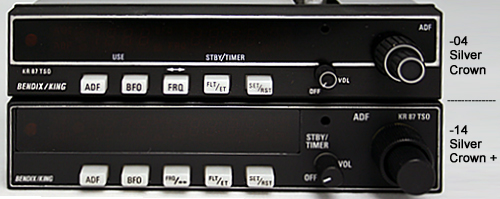
What are the advantages of installing an RMI over an ADF indicator?
The use of a Radio Magnetic Indicator in an aircraft offers several benefits that improve navigation situational awareness and pilot workload.
A very basic ADF indicator without a moveable compass card simply points to a selected beacon. The pilot must calculate the bearing needed based on the aircraft's current heading. Most if not all ADF indicators without a knob to turn the compass ca rd are very old and obsolete.
Most ADF indicators include a knob to turn the present heading so that the bearing to the beacon can be read against the compass card.
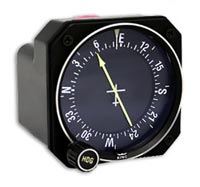
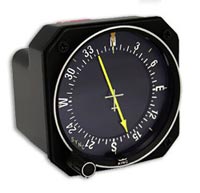
The RMI provides all of the ADF indicator functions with automatic rotation of the compass card via the aircraft's compass system. Therefore, whenever the aircraft turns then the compass card will turn.
An RMI always automatically points to the bearing to a beacon. This is a more logical form of indication even over VOR type of navigation since there is no OBS, To-From, radials, etc.
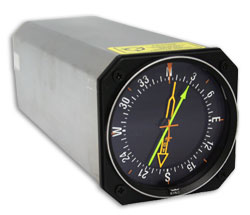
More advanced RMI indicators offer even more flexibility and features by offering dual needle for ADF and VOR bearing and multiple ADF/VOR navigation.
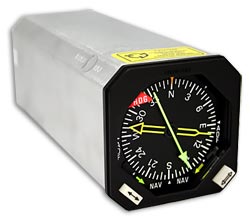
Do the -01 versions for the KI-227 and KI-228 replace the need for an RMI?
I currently have a KR-85 ADF that continues to give me trouble, should I buy another KR-85 or consider upgrading?
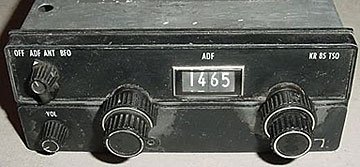
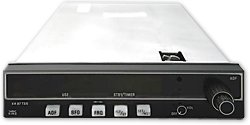
Instead of continuing to invest your money in obsolete technology and delaying the inevitable, Southeast Aerospace suggests upgrading to the KR-87 ADF. Investing in the KR-87 will provide you with an ADF that includes warranty and support for many years to come. Plus, since the KR-87 is smaller it will free up valuable panel space in your aircraft.
The flight timer on my new KR-87 is different than what I am used to, what could be the problem?
Are SEA's Exchange prices negotiable?
Negotiating the exchange price of a unit only limits the allowable repair cap for the core unit. Southeast Aerospace's exchange transactions are based on the return of economically repairable core unit. Once the core is received and evaluated, the core repair cost incurred by SEA cannot exceed 75% of the original exchange price. That is, it cannot cost SEA more than 75% of the original OH/SV exchange price collected from the customer. Therefore, when and if an SEA exchange price is discounted, there is a risk that additional charges may be assessed once the core is returned and evaluated.
I need some pins for my Silver Crown unit, how can I get them?
The part number for the terminal contact pin that is used on most Silver Crown units is 030-01107-0000. Previously, Honeywell (Bendix/King) offered them in preset amounts based on the unit that were being used with (ex. 030-01107-0064 for the KX-155). Currently, you simply purchase the amount of -0000 pins required.
As of 2010, the List Price for each contact pin is $5.98. Therefore, in most cases, it is less expensive to buy the entire unit installation kit.



